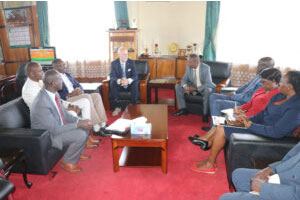
Posted on : Wednesday , 28th May 2025

Moi University has strengthened its collaboration with Kenyan engineering company Afriwatt to begin phase two of its solar energy project in an effort to create a more sustainable future. The project intends to lower the university's electricity expenses, encourage climate action, and improve student training and research prospects.
Acting Vice-Chancellor Prof. Kiplagat Kotut spoke during the launch at Moi University's main campus in Kesses, saying the project is an important component of the university’s recovery strategy in the face of persistent financial difficulties.
Prof. Kotut stated, "We are honoured to begin the second phase of a project that will scale from kilowatts to megawatts in sustainable energy production, and we fully support this initiative."
He said that in order to provide clean energy for campus operations, the institution intends to build a 30 MW renewable energy park, with the option to send excess power into the national grid. It is anticipated that the project will help the local community in addition to the institution.
Through cutting-edge research hubs, the project would reduce electricity prices, protect the environment, and promote sustainable growth, Prof. Kotut stated.
In order to promote the use of renewable energy sources and aid in the fight against climate change, he also emphasized the significance of establishing collaborations with research and development organizations.
Moreover, to help Moi University engineering students develop their technical skills, he urged Afriwatt to consider providing internships and hands-on training.
According to Thomas Cheruiyot, executive director of Afriwatt Engineering Ltd., the project has already produced 23.12 megawatts and intends to reduce reliance on the national grid by 36.9% while increasing electricity savings from 11.12% to 32.3%.
“Currently, we are in the process of producing 5 megawatts of solar power to be used to decarbonize every building within the university. These measures are expected to result in significant reductions in electricity costs.†Cheruiyot noted Furthermore he said that the administration block and other buildings at the institution will be completely powered by the Sh 4.2 million, 57.1 kW solar PV grid-tie system. Green hydrogen, which may be stored for later use or sold as a valuable industrial fuel, will be created using excess solar energy.
The university intends to construct a facility for processing hydrogen and producing ammonia for green fertiliser after Phase Two is finished. Cheruiyot claims that in order to conduct efficient research and talent development, these energy-intensive procedures need sustainable power sources.
The solar energy project is a component of MUREPHAR, a larger project called the Moi University Renewable Energy Innovation Park and Green Hydrogen, Ammonia and Fertiliser Research Hub, which was introduced in September 2024.
The goal of this project is to advance sustainable development, innovation, and research in renewable energy technology.
Expogroup is a full service exhibition organiser with over eighteen years experience in International.Trade Exhibitions and Events. Our current portfolio includes 20 annual exhibitions from a diverse range of industries being held across the Middle East & Africa.
EXPOGROUP © 1996 - 2025 | Privacy PolicyJoin our mailing list and receive latest news and advice from us in our monthly Newsletter
Yes, I would like to receive Expogroup E-newsletters
